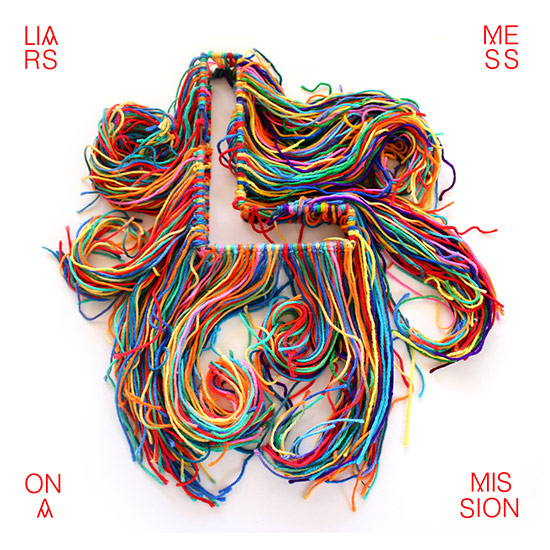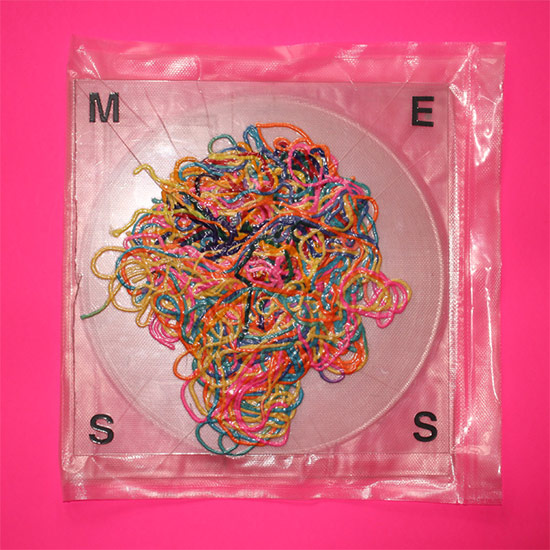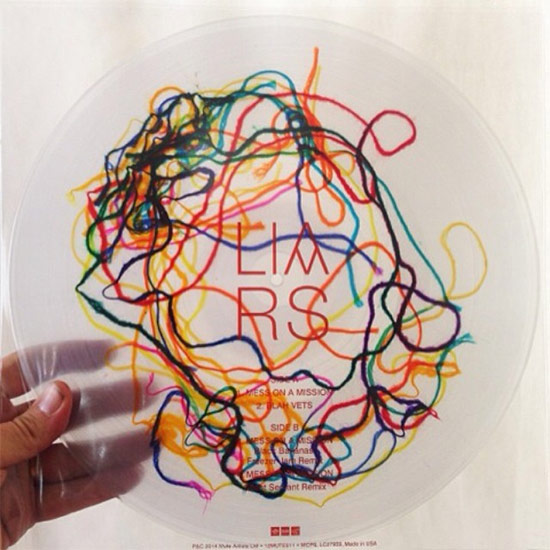
This kind disease could run its course
This time will be a whole brand new route
This comforts all that ached before
I might just start to believe in trust
– “Perpetual Village”
I brood in ecstasy, a thought to wrap my head around.
– “Pro Anti Anti”
Singer and guitarist Angus Andrew’s focus on Mess is putting problematic issues to beneficial use, on-trend with current popular strains of psychology devoted to mindfulness and cognitive behavioral therapy. In mindfulness meditation, one learns to accept a thought without judgment, to live in the present and simply notice what can’t be noticed when one’s head is mired in past events or nerves over future events. Cognitive behavioral therapy holds that our patterns of thinking — the way we catastrophize situations and make grand leaps in logic toward negative outcomes — can be changed by naming them, taking away their control over our lives. The question, then, is whether these trends have merit.
 “I think it depends on where a person is at in their personal life, and how much this negativity is distorting a path to self-cultivation and development of their individual perspective,” explains Liars co-founder Aaron Hemphill (guitar, synthesizer, percussion). “I don’t think all negativity has something useful to be found in it, nor do I believe all negativity should be converted into positivity in order for it to be useful. Sometimes the only proactive thing to do is follow negative tendencies until the bitter end of the tunnel.”
“I think it depends on where a person is at in their personal life, and how much this negativity is distorting a path to self-cultivation and development of their individual perspective,” explains Liars co-founder Aaron Hemphill (guitar, synthesizer, percussion). “I don’t think all negativity has something useful to be found in it, nor do I believe all negativity should be converted into positivity in order for it to be useful. Sometimes the only proactive thing to do is follow negative tendencies until the bitter end of the tunnel.”
We don’t outgrow hard feelings
– “Left Speaker Blown”
“It depends on what is needed for the individual,” Hemphill continues. “I suppose a broad rule to follow might be that negativity should be followed if and when it truly resonates with where a person is at in their life. If one feels obligated to turn negativity into something positive based on another’s wishes, I believe this will only prolong the negativity, and lead an individual further away from finding the true answer to their question.”
I always wondered how
To rid myself of doubt
Haven’t really been forced in awhile
– “Vox Tuned D.E.D.”
The use of the word “forced” in “Vox Tuned D.E.D.” is interesting; it suggests that Andrew has had a lack of agency in these matters, and there’s a twinge of resentment, or “hard feelings” accompanying the desire to make personal progress. Perhaps conventional therapy hasn’t fully explored the punk rock approach of following the resentment down the rabbit hole to see whether it kills us or charges our creative batteries.
Connection, Dislocation & Influence
In a REDEFINE interview from 2010, Andrew mentioned that the band felt dislocated from what was going on — unconnected to music, culture, and Los Angeles, in general. Such factors were at the root of the band’s record, Sisterworld — and though circumstances have changed, Hemphill thinks the sense of disconnection is still there, although not necessarily in a negative way.
 “It’s not that we’ve been shunned or that we don’t feel that anything is of merit,” he says.
“It’s not that we’ve been shunned or that we don’t feel that anything is of merit,” he says.
It’s more that Liars repeatedly tend to become hermits when they drill down to make a record, which Hemphill admits is caused by a fear of outside influence. Now that Mess is completed, the band is taking time to see more live music, and that helps keep them feel connected, although Hemphill says “connection” is a strong word — unsurprising for a group so guarded in most aspects of its career. Los Angeles itself is not an inspiration for this album, though, so disconnection to the city is irrelevant.
“What is inspiring us now has very little to do with our surroundings, more to do with our tools,” explains Hemphill. “Given that, we feel that we could make the same record in any environment because we’re so immersed in work and our tools that that’s our world primarily right now.”
Bands that succeed in America are generally eager to relate, to seem lovable and make a real connection. Liars project a more European aloofness — something that the band’s time in Berlin may have cemented even further. Their refusal to hold onto anything as basic as a “musical direction” for more than a single album would come off as a dare to the fanbase if Liars weren’t operating in and creating such a self-contained universe, an ecosystem that can thrive even without exterior influence.
Liars don’t take success for granted; the band sees changes in the music climate as a “creative challenge” and approaches every album or tour like it’s their last. That connection, such as it is, comes by giving fans “what you yourself would want to have put out there.”
Making music full-time is the band’s dream, says Hemphill, and even if outside circumstances prevent that in the future, he would hate for it to be because of a lack of effort. The band still plays shows as if no one had ever heard of them, and still refuses to phone it in (“You don’t know how far someone drove”).
“We try to treat everything like it’s our last,” Hemphill emphasizes once again. “That’s why we still feel really nervous when we play. It adds a lot of nervous energy to our performances, and hopefully it has created a consistency throughout the years of our live shows.”
Liars on Art Direction & Album Cover Artwork

The cover concept on Mess, according to drummer and art director Julian Gross, is “always changing” and “undulating” like an animal, appropriate for a band that is constantly reinventing its sound, but also apt for this record in particular, given Liars’ renewed vigor and gleeful catharsis. Mess‘s art takes its inspiration from John Baldessari and Urs Fischer, and it makes sense: both Baldessari and two members of Liars share a connection to the California Institute of the Arts, and Fischer recently had an exhibit at the Museum of Contemporary Art in Liars’ home base of Los Angeles.
This time around, Hemphill stepped back and let Gross and Andrew develop the visual ideas, chipping in later on to produce photos and videos supporting those ideas. “It was mainly that we wanted it to be colorful and vibrant and crisp. That was the main guiding force, and then afterward, as the concept became clear and we each added definition to it after the fact, conceptually we each explored different influences in the visual art field.”
It’s not important that the viewer “get” the meaning of Mess‘s art, says Hemphill, just that it maintains a through-line. “It’s not a conceptual piece in that its success is dictated by how many people understand the concept.”


Liars extend this experience into the hands of fans with physical objects, including a Record Store Day 12″ vinyl with string embedded into it, as well as a limited edition run of 500 vacuum-sealed 2xLPs, hand-made by the band and vacuum-sealed with globs of string. Both, especially the latter, are a magnanimous way of allowing viewers of the cover art to go with their gut in accordance with the very instinctual collection of musical and visual ideas on display.
The band has also explored a number of street art installations throughout California, bringing their Mess to unsuspecting drivers and billboards everywhere.


Easily Attainable Objects, Secret Knowledge, and Spontaneity: The Creative Process Behind Mess
We count to 4 then face the tide
– “Boyzone”
Where WIXIW‘s creative process was slowed by a learning curve with unfamiliar technology, the writing was easier and more “spontaneous” on Mess, says Hemphill. Nonetheless, the recording setups and use of software synthesizers for the two albums were largely the same; Liars made both records using Pro Tools and Reaktor — Native Instruments’ graphical modular sound studio — as well as a variety of plug-ins. This time, though, the band was more self-assured and less glued to the instruction manual.
“We felt that we were gaining some sort of knowledge with [the technology], and that it’d be a shame to abandon it at that point,” Hemphill explains, “because we felt a different side of the creative connection with soft synths, and it seemed to be a bit more fluid and very exciting, so we just kept with it.”
Reaktor has a customizable online user library where people create different instruments, and according to Hemphill, the band downloaded 50 a day in search of sounds they wanted to incorporate into Mess. He is a fan of Reaktor’s home-built ensembles, including a “sequencer that this guy built that’s really raw-sounding” that Liars have used a couple times. In general, though, Hemphill notes that he’s reluctant to publicize the band’s favorite software instruments and effects, because, “They’re kind of obvious, and they’re kind of secret”, and he doesn’t want to give too much away.
Analog synthesizers are present on Mess as well: a monophonic standalone synth called Dark Energy, and a Korg MS2000 that a friend gave the band. These incorporations reflect Liars’ creative mentality; they’re fans of “easily attainable and universal objects,” and aren’t afraid of things one might find on the sale rack at Guitar Center.
One example is the vocoder Angus Andrew employed on “Dress Walker” — a minimalist electro-funk workout with some Nine Inch Nails squelch. Hemphill says that during Mess‘s writing process, he noticed Andrew at the MS2000, playing with the vocoder. “And I was dreading, like ‘Oh my god, he’s going to spend all this time on the song, and he’s going to show it to me, and I’m going to have to tell him, dude, the vocoder sucks’.”
Ultimately, though, Hemphill was convinced that Andrew’s “incredible creative talent” would make the track unique, and he was right. “It’s just singular tones that aren’t fluctuating so much, so it adds this really beautiful resonance to his vocal,” he explains.
“Darkslide”, an instrumental track with a tribal, My Life in the Bush of Ghosts feel, has been a favorite of those the band have asked for advice, although it nearly didn’t make it onto the record. Liars spent a considerable amount of time attempting to write a vocal for it, but the band felt it “expressed what we wanted to with the instruments, and that the sounds moved the song and progressed the arc of the song better than words could.”
Mess on a Mission
When the world sings from the halls, and the demon’s at the door
Let the one inside and sing along
– “Dress Walker”
Though Liars’ work ethic remains meticulous, this time around, we see the band giving themselves permission to be Messy, to invent wildly weird moments that aren’t necessarily deathless artistic statements. On “Mask Maker,” Andrew uses a voice manipulation tool to intone, “Take my pants off,” and, “Smell my socks,” in a commanding baritone. “Mess on a Mission” has an early video game’s sense of purposeful urgency, as if the “Mess” is its own character in the Liars canon and he’s ascending cheaply animated levels against all odds to save a groovy noise princess. “Darkslide” feels like following a waterfall down into the mercurial jungle river of a Werner Herzog film, and splashing around insouciantly as the natives come closer.
It’s not totally an escapist record, though. It’s alert and reflective; even the title of “Left Speaker Blown” suggests that Liars knows it’s all fun and games until someone loses an eye.
Mess ends on a meditative drone, with a sampled male voice bringing us back to the present:
“Say the word shout… say the word limb.”
At first blush, the instructions seem disjointed — Messy, even — but further listening suggests they might be part of a lie-detector test, or a hypnotism session where secret truths are revealed. Confidence sometimes has connotations of being dishonest, putting one over on people, but it’s also a marker of being real with yourself. The voices trying to shut down the accepting-without-judging brain of an otherwise confident person are, in fact, the liars.
Ω







[…] – Brooding in Ecstasy With Mess’s Playful Catharsis, interview par Jody Beth Rose sur Redefine mag – A Tidy Mess, interview par Matt Fink sur Under the […]